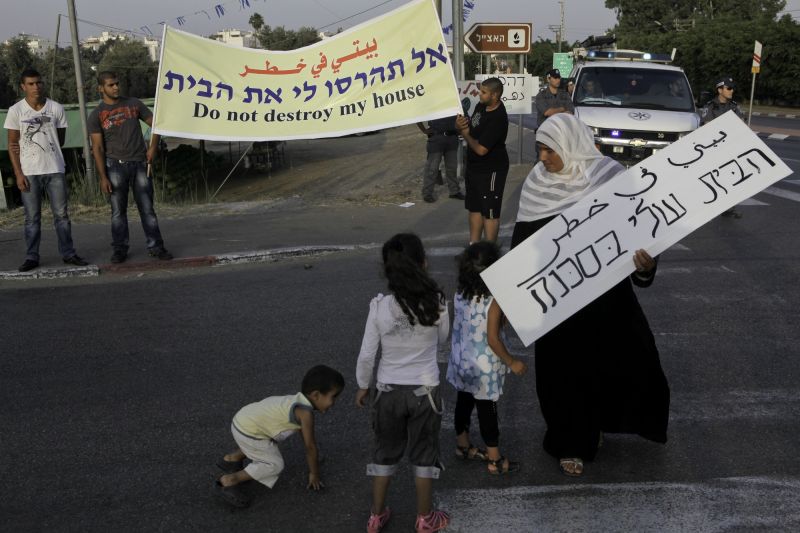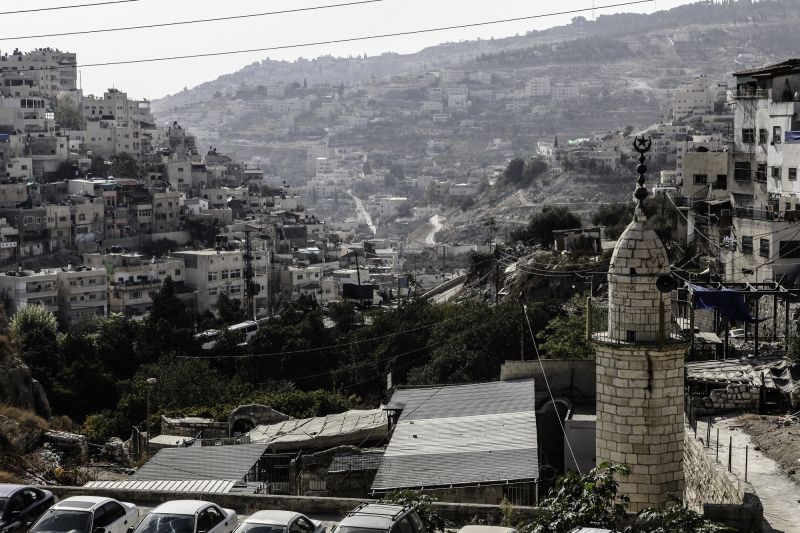Israeli government conditions housing budget for Arab communities on demolition of 'illegal' homes
Adalah submitted a letter to senior Israeli government officials on 19 June 2016 demanding that they refrain from backing a proposal that would make the distribution of housing budgets for Arab communities in Israel dependent upon the widespread demolition of homes that have been constructed without the appropriate permits.
Nevertheless, later that same day, the government decided to back the proposal.

Palestinian citizens of Israel protest against home demolitions in Ramle (File photo/Mati Milstein)
The letter, filed by Adalah on behalf of the National Committee for Arab Mayors in Israel, was addressed to Israeli Prime Minister Benjamin Netanyahu, Attorney General Avichai Mandelblit, and to several government ministers.
In late 2015, the government approved a five-year plan (covering 2016 to 2020) to modify the allocation mechanisms of government funds to the Arab population. The program comes at an estimated cost of NIS 15 billion (approximately U.S. $3.95 billion), and it purports to partially amend the ongoing fiscal discrimination towards Palestinian Arab citizens of Israel in many fields, including the field of construction and housing.
However, a few days after the approval of the decision in late 2015, the government decided to delay the plan’s implementation in all issues regarding housing. The government claimed that it was awaiting the publication of the recommendations of the inter-ministerial committee appointed in February 2015, which was instructed to examine ways of handling the phenomenon of “illegal” construction.
It was these recommendations that the government decided to approve on 19 June 2016.
Adalah Attorney Mohammad Bassam wrote in the letter that the proposal had no legal basis: "The conditioning of budgetary rights on demolitions is akin to applying a carrot and stick policy upon the Arab population, and the National Committee for Arab Mayors does not accept this situation. This condition has no legal or constitutional basis, and it is a form of collective punishment that runs in direct opposition to the principles of the legal system."
In addition, Adalah also maintained that the transfer of funds for the improvement of housing facilities in the Arab communities in Israel is not a privilege to be earned but rather a partial correction for historic discrimination.
"We emphasize that the budget increase for the five-year plan for the improvement of housing in the Arab communities is not a matter of charity but rather a matter of right. The increase is required given the harsh housing situation faced by the Arab population, which is the result of historic discrimination resulting from the decisions of the Supreme Court as well as official government committees," Attorney Bassam wrote.
"Pre-conditioning 'the closing of gaps' on home demolitions introduces an irrelevant consideration into the decision and this is uncalled for," Adalah stated. "This clashes directly with the stated purpose of the government's five-year plan, which is to compensate for the budgetary discrimination from which Arab citizens have been suffering. This is a blanket condition that has no connection to the purpose which the budget increase is meant to serve."
According to a March 2016 Adalah report, based on official figures, only 4.6 percent of the housing tenders published by the Israel Land Authority (ILA) in 2015 were dedicated to Arab communities in Israel, although the population comprises 20 percent of the population. The ILA published tenders for the construction of 38,095 housing units in Israeli Jewish and mixed Arab-Jewish communities, as opposed to only 1,835 housing units in Arab towns and villages.
The Arab population in Israel requires 13,000 new housing units per year, yet in practice only 7,000 housing units are built, mostly by means of private, self-construction. The significance of this shortfall is that there is a shortage of 6,000 units every year, in addition to the shortage that has accumulated over decades, the scope of which has yet to be estimated.
As a result of the government's widespread failure to authorize a sufficient number of building permits in Arab communities, the phenomenon of "illegal" home construction is widespread as residents seek to house expanding populations.
Given the critical housing shortage, the National Committee for Arab Mayors in Israel, naturally, objected strenuously to the government's plan to carry out mass demolitions on a national scale of homes built without permits.

The housing shortage in Arab communities in Israel is not the result of specific failures or unintentional neglect on the part of state authorities. It is instead the product of a systematic and deliberate policy since 1948 that has viewed Palestinian citizens as enemies and aliens.
In contrast to its neglect of housing in Arab communities, the Israeli government also decided on 19 June 2016 to funnel an additional U.S. $20 million in funds to Jewish settlements in the West Bank.













